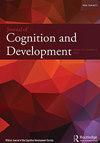幼儿未来认知的产生和发展:认知能力和语言能力的贡献
IF 1.6
2区 心理学
Q3 PSYCHOLOGY, DEVELOPMENTAL
引用次数: 1
摘要
摘要近二十年来,儿童未来认知的发展已成为一个热门的研究课题。这项研究大多集中在学龄前和儿童中期,但对学步儿童和学龄前儿童的未来认知能力知之甚少。本研究调查了幼儿期未来导向认知的出现,并探讨了其与认知(即执行功能、情景记忆和自我概念)和语言能力(即表达词汇、亲子对话、时间词汇使用和时间隐喻使用)的关系。居住在美国的2至3岁儿童的父母(N=205)参加了一项在线研究,他们完成了儿童未来思维问卷(CFTQ),以评估孩子在五个关键领域的未来认知。此外,还对执行功能、自我概念、情景记忆、表达性词汇、亲子对话、儿童的时态词汇使用和儿童对时间隐喻的使用进行了家长报告测量。2岁的孩子就表现出了面向未来的能力。然而,2岁儿童的父母有大量缺失的数据(例如,“不适用”),尤其是在CFTQ的计划和前瞻性记忆分量表中。三岁儿童在计划和前瞻记忆分量表上的评分高于2岁儿童,但2岁和3岁儿童在储蓄、情景预见和满足延迟分量表上没有差异。情节记忆和时间隐喻的使用是面向未来认知的重要独立预测因素,因此,这两种能力可能在幼儿出现面向未来认知中发挥重要作用。本文章由计算机程序翻译,如有差异,请以英文原文为准。
The Emergence and Development of Future-Oriented Cognition in Toddlerhood: The Contribution of Cognitive and Language Abilities
ABSTRACT The development of children’s future-oriented cognition has become a popular research topic in the past two decades. Much of this research focuses on the preschool and middle childhood years, but very little is known about the future-oriented cognitive abilities of toddlers and young preschoolers. The present study investigated the emergence of future-oriented cognition in toddlerhood and explored its relation with cognitive (i.e., executive function, episodic memory, and self-concept) and language abilities (i.e., expressive vocabulary, parent-child talk, temporal word use, and time metaphor use). Parents (N = 205) of 2- to 3-year-old children residing in the United States participated in an online study in which they completed the Children’s Future Thinking Questionnaire (CFTQ) to assess their child’s future-oriented cognition in five key domains. Also, parent-report measures of executive function, self-concept, episodic memory, expressive vocabulary, parent-child talk, child’s temporal word use, and child’s use of time metaphors were administered. Children as young as 2-years-old demonstrated future-oriented abilities. However, parents of 2-year-olds had substantial missing data (e.g., “does not apply”), especially in the planning and prospective memory subscales of the CFTQ. Three-year-olds were rated higher than 2-year-olds on the planning and prospective memory subscales, but there were no differences in ratings for 2- and 3-year-olds on the saving, episodic foresight, and delay of gratification subscales. Episodic memory and time metaphor use were significant independent predictors of future-oriented cognition and thus, both abilities may play a fundamental role in the emergence of future-oriented cognition in young children.
求助全文
通过发布文献求助,成功后即可免费获取论文全文。
去求助
来源期刊

Journal of Cognition and Development
Multiple-
CiteScore
4.00
自引率
0.00%
发文量
29
期刊介绍:
The Journal of Cognition and Development is the official journal of the Cognitive Development Society (CDS). Some CDS members are concerned with basic research or theory; others focus on policy issues and practical applications. The range of interests includes cognitive development during all stages of life, and we seek to understand ontogenetic processes in both humans and nonhumans. Finally, their interests encompass typical as well as atypical development, and we attempt to characterize both biological and cultural influences on cognitive change and continuity.
 求助内容:
求助内容: 应助结果提醒方式:
应助结果提醒方式:


